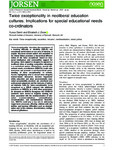Twice exceptionality in neoliberal education cultures: Implications for Special Educational Needs Coordinators
| dc.contributor.author | Done, Elizabeth | |
| dc.contributor.author | Demir, Y | |
| dc.date.accessioned | 2022-05-03T10:19:30Z | |
| dc.date.issued | 2022-04-18 | |
| dc.identifier.issn | 1471-3802 | |
| dc.identifier.issn | 1471-3802 | |
| dc.identifier.uri | http://hdl.handle.net/10026.1/19135 | |
| dc.description.abstract |
‘Twice exceptionality’ describes the coexistence of a learning difficulty or disability (SEN/D) and exceptional performance in one area of learning. A popular discourse around autism and savantism in the United States promotes a hierarchical differentiation of the ‘twice exceptional’ based on measured intelligence and commodifies support for this group. Such support is designed to appeal to a neoliberal ethos of seeking competitive advantage in a marketised system. Alternatively, special educational needs co-ordinators (SENCOs) could raise awareness and promote a non-hierarchical understanding of ‘twice exceptionality’ in schools, thereby highlighting what is missed when allegedly science-based discourses become hegemonic within education and when governmentally mandated accountability practices are prioritised over professional judgement and the interests of individual students. Calls for ‘twice exceptionality’ to be recognised as a SEN/D category risk additional pressures on SENCOs at a time when governmental demands on SENCOs throughout the COVID-19 pandemic have served to heighten existing tensions associated with the neoliberalisation of education (commercialisation, commodification, decentralisation, and residualisation). Nevertheless, SENCOs could play a key role in addressing longer-term processes affecting children with dis/abilities and learning difficulties such as stigmatisation and, in this instance, discriminatory configurations of ‘giftedness’. | |
| dc.format.extent | 266-273 | |
| dc.language | en | |
| dc.language.iso | en | |
| dc.publisher | Wiley | |
| dc.subject | 4 Quality Education | |
| dc.title | Twice exceptionality in neoliberal education cultures: Implications for Special Educational Needs Coordinators | |
| dc.type | journal-article | |
| dc.type | Journal Article | |
| plymouth.issue | 3 | |
| plymouth.volume | 22 | |
| plymouth.publication-status | Published | |
| plymouth.journal | The Journal of Research in Special Educational Needs | |
| dc.identifier.doi | 10.1111/1471-3802.12564 | |
| plymouth.organisational-group | /Plymouth | |
| plymouth.organisational-group | /Plymouth/Faculty of Arts, Humanities and Business | |
| plymouth.organisational-group | /Plymouth/Faculty of Arts, Humanities and Business/Plymouth Institute of Education | |
| plymouth.organisational-group | /Plymouth/REF 2021 Researchers by UoA | |
| plymouth.organisational-group | /Plymouth/REF 2021 Researchers by UoA/UoA23 Education | |
| plymouth.organisational-group | /Plymouth/Users by role | |
| plymouth.organisational-group | /Plymouth/Users by role/Academics | |
| dcterms.dateAccepted | 2022-03-20 | |
| dc.rights.embargodate | 2022-5-4 | |
| dc.identifier.eissn | 1471-3802 | |
| rioxxterms.versionofrecord | 10.1111/1471-3802.12564 | |
| rioxxterms.licenseref.uri | http://www.rioxx.net/licenses/all-rights-reserved | |
| rioxxterms.type | Journal Article/Review |


